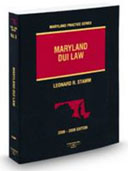This past Thursday the Maryland Court of Appeals held oral argument in Motor Vehicle Administration v. Deering. John K. Phoebus of Salisbury, Maryland argued on behalf of Ms. Deering that Deering’s license should not have been suspended when the police officer would not let her call her lawyer before deciding whether to take or refuse a breath test. She elected to submit to the breath test and failed. The rule of Sites v. State, decided in 1984, is that when a person arrested for DUI asks to call a lawyer, they must be allowed an opportunity to do so that does not interfere with the State’s ability to obtain a breath test. The rule was clearly violated in Deering’s case, but the MVA argued that the violation cannot be raised as a defense at the administrative hearing, only in court.
An amicus brief filed by Leonard R. Stamm on behalf of the National College of DUI Defense (NCDD) and the Maryland Criminal Defense Attorneys’ Association (MCDAA) came up during oral argument. Chief Judge Mary Ellen Barbera noted that one of the claims in the brief was that if the Court ruled in the MVA’s favor it would be changing the status quo. The brief stated that the Sites defense has been allowed at MVA hearings for 30 years. The brief also stated that it was only relatively recently that a growing number of judges have started to disallow the defense, as a result of the Court’s decision in Najafi v. Motor Vehicle Administration. Najafi had stated in dicta (meaning a statement by the Court that is not necessary to resolve the case and therefore not binding on lower tribunals) that the denial of counsel defense could not be raised at the MVA license suspension hearing. However, Chief Judge Barbera noted that there was no data cited to support this statement and wanted to know from counsel whether they agreed with it. Counsel for the MVA, Leight Collins, did not dispute the statement and acknowledged that there is no data base from which data could be culled to support or opposed the statement. Rather, there are paper records of the hearings. So there is no data that could have been provided.
The amicus brief was also quoted in the Daily Record.
“The manner in which the officer reads the form can…detract from its ability to be understood,” attorney Leonard R. Stamm wrote in the friend-of-the-court brief. “Additionally, most suspects have no legal training or understanding to assist them in making an intelligent decision, that usually occurs late at night, when they are tired, afraid, upset and traumatized.”
Stamm is with Goldstein & Stamm P.A. in Greenbelt.
A number of judges asked whether officers were required to advise suspects of their right to call a lawyer. The Court had rejected a similar claim years earlier in McAvoy v. State.
A decision is expected later this year.
If you are facing criminal or traffic charges in Maryland state or
federal court, call Leonard R. Stamm of Goldstein
& Stamm, P.A. at 301-345-0122 for a free consultation.
Leonard R. Stamm
Goldstein & Stamm, P.A.
6301 Ivy Lane, Suite 504
Greenbelt, MD 20770
301-345-0122
(fax) 301-441-4652
www.dwiattorneymaryland.com
https://www.marylandduilawyer-blog.com
marylandduilaw@gmail.com
Author: West’s Maryland DUI Law

 Maryland DUI Lawyer Blog
Maryland DUI Lawyer Blog

